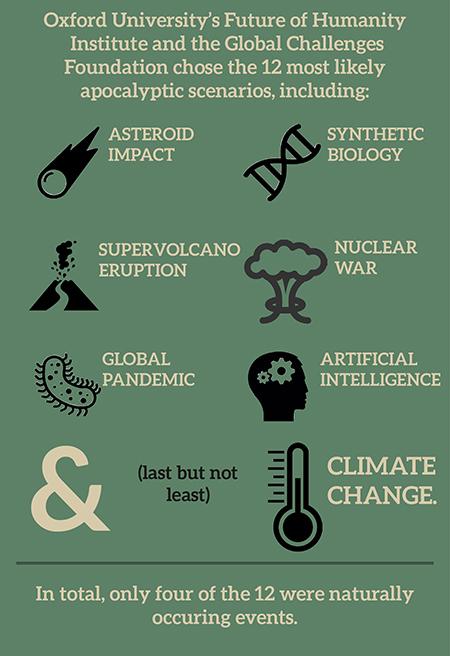It looks like my favorite image was captured by a novice who forgot to take the lens cap off.
It is but three grainy streaks of light, cutting across a black background. Hanging within the beam farthest to the right is a small but distinct speck, barely the size of a pixel.
To quote astronomer Carl Sagan, “That’s here. That’s home. That’s us.” That pale blue dot is Earth from 3.7 billion miles away.
In an era that seems to drive people farther and farther apart, the simple lesson of human fragility this picture provides is key. That tiny pinprick of light is everything we have ever known, and unless we put aside our differences, we won’t learn anything else about our great big universe.
Between partisan elections, xenophobic fear mongers, religious extremists and jerks with Twitter accounts, the world has never seemed so divided. But the fact is, cosmically, our home is tiny and insignificant, and the universe could snuff it out at any time, in many ways. And in death, we are one.
If a meteor, comet or gamma ray burst just so happens to aim itself at our tiny mote of dust, no artificial human boundaries will condemn or spare any of us to life or death. It will just be the end of 300,000 years of evolution for our species. And that’s not even mentioning internal issues that could doom the planet, like climate change.
The threats from space don’t even have to be so existential. According to astronomers at the University of Colorado, in 2012, a massive solar flare — a large burst of radiation from a star —was but a cosmic stone’s throw away from hitting the Earth. The flare would have overloaded most of the planet’s electronics.
That wouldn’t spell the doom of our species, but it would mean the end of life as we know it.
Zooming ahead about five billion years, the Earth itself will be destroyed anyway, when the sun balloons — part of its natural evolution as a star — until it envelops all of the inner solar system, including Earth.
Our imminent demise shouldn’t scare us, though. Humanity’s greatest ability as a species is to laugh in the face of danger, to look at long odds and say, “We still have a shot.” Our heroes of science, sports, war and peace all have that trait in common.
When you really think about what our species has accomplished, it’s pretty outstanding.
In roughly 8,000 years — .0002 percent of the Earth’s existence — we have spread our progeny to every climate and continent, constructed societies and civilizations, learned the secrets of the natural world and bent them to our advantage.
But, as Voltaire and Stan Lee said, “With great power comes great responsibility.” When global temperatures are rising and people are still going hungry, it’s hard to say we have conquered want or mastered nature.
Just try to imagine a theoretical setting, some hundreds of years in the future. Earth’s climate is stable, we’ve moved past scarcity, and the first spaceship to Alpha Centauri is set to launch. But at this seeming apogee of human accomplishment, a comet comes in and smashes our achievements to dust.
There would be something noble in that end. It would be like a cosmic Sisyphus. Statistical probability says that intelligent life exists somewhere else in this universe. Scientists agree that habitable planets are rare. But according to a study conducted by the California Institute of Technology, the universe contains about one septillion planets. That’s a one followed by 24 zeroes.
So just as our attempt to expand past our small homeworld fails, a new species with its own potential is sure to pop up and roll the boulder of civilization back up the hill of existence.
But if we just kill ourselves off because of two theoretical stubborn ideologues with nuclear weapons or an inability to stop pumping carbon into the atmosphere, then there wouldn’t be much to be proud of.
No ideology is worth ending the world over — real change comes from us banding together in our common frailty. It’s not going to happen quickly or easily, but there is always a better alternative. As soon as we stop believing in a better alternative, we might as well throw away the last 8,000 years of progress.
Let the only thing matching our planet’s fragility be the heights of our ambition. Then, maybe one day, we won’t need a camera to see the pale blue dot ourselves.
Stephen Caruso is a senior columnist at The Pitt News. He mainly writes on economic and social issues. He is also the production manager.
Email Stephen at [email protected].



